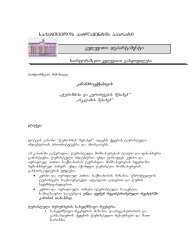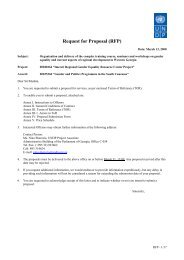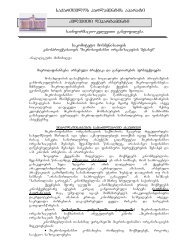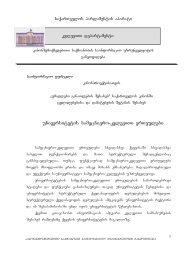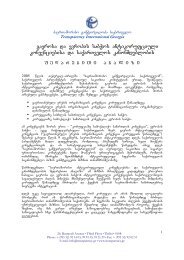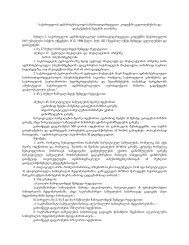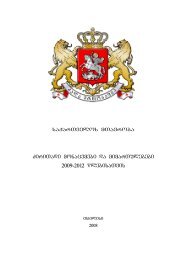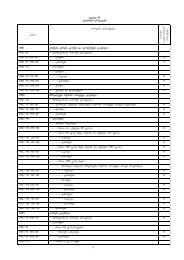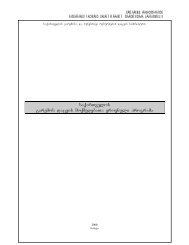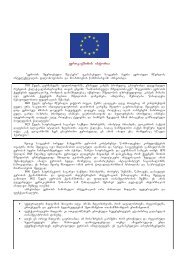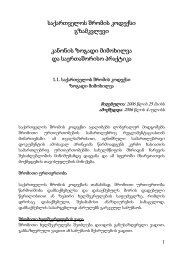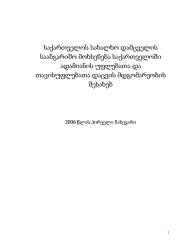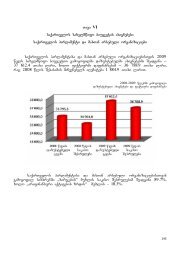UNDP - Parliament of Georgia
UNDP - Parliament of Georgia
UNDP - Parliament of Georgia
- No tags were found...
Create successful ePaper yourself
Turn your PDF publications into a flip-book with our unique Google optimized e-Paper software.
UNITED NATIONS DEVELOPMENT PROGRAMME (<strong>UNDP</strong>)Strengthening Effectiveness and Transparency <strong>of</strong> the <strong>Parliament</strong> <strong>of</strong> <strong>Georgia</strong>ACTIVITIES IN 2007In 2007 the Project assisted the <strong>Parliament</strong> <strong>of</strong> <strong>Georgia</strong> capacity development through thefollowing activities:‣ Enhancing internal structures and processes/Human Resources Development‣ Modernization <strong>of</strong> law-making process‣ Development <strong>of</strong> Public Relations‣ Promoting <strong>of</strong> ICT Tools for Democratic GovernanceENHANCING INTERNAL STRUCTURES AND PROCESSES / HUMAN RESOURCESDEVELOPMENTThe Project team supported the <strong>Parliament</strong> in solving managerial and organizational issuesrelated to the rationalization <strong>of</strong> the organizational structure; namely: modernization <strong>of</strong> intraagencyrelations, supervising function <strong>of</strong> the <strong>Parliament</strong>, document flow, law-draftingprocedures, public relations management, personnel management and other practices.Under the analytical activities undertaken by the team aimed to identify the strategicpriorities for raising the efficiency <strong>of</strong> the <strong>Parliament</strong>'s activities, the project collected relevantinformation, performed its systematization, analysis and prepared analyticalmaterials/recommendations/reports. 11 project recommendations have been incorporated invarious legal acts and are used in practice (for detailed information on workshops, pleaserefer to the Annex). All the above mentioned materials were handed over to the leadership <strong>of</strong>the <strong>Parliament</strong> during the year 2007.23 methodological recommendations on general management procedures have beenprepared and passed over to the beneficiaries. The project was focused on elaboration <strong>of</strong>recommendations and development <strong>of</strong> HR management procedures, including staffrecruitment, attestation and carrier management. The project was providing support to the<strong>Parliament</strong> in implementation <strong>of</strong> further development <strong>of</strong> human resources and trainingsystem and preparation <strong>of</strong> relevant manuals, guides. All these project outputs weresubmitted to the parliamentary top management and direct beneficiaries. Elaboration <strong>of</strong>recommendations is a result <strong>of</strong> joint work <strong>of</strong> the project staff and members <strong>of</strong> <strong>of</strong>ficiallycreated (by the decree <strong>of</strong> the Speaker) working groups, composed by the MPs andmanagerial staff <strong>of</strong> the <strong>Parliament</strong>. The Speaker <strong>of</strong> the <strong>Parliament</strong>, Ms. N.Burjanadze,Deputy Speaker Mr. M.Machavariani and Chief <strong>of</strong> Staff <strong>of</strong> the <strong>Parliament</strong> Mr. G.Martinenkoare in charge <strong>of</strong> adopting the recommendations.Within the personnel management component, the project team took an active part in thereform <strong>of</strong> the personnel management carried out in the parliament in the first and secondquarters <strong>of</strong> the year. The team was closely involved with the planning and properorganization <strong>of</strong> the certification/attestation process held in the <strong>Parliament</strong> and the National1
<strong>Parliament</strong>ary Library <strong>of</strong> <strong>Georgia</strong>. Upon the recommendation <strong>of</strong> the project, the Attestationand Contests Committee introduced the applicant's evaluation form at the final stage <strong>of</strong> theselection process, i.e. during final interview. The project consultants finalized the draft <strong>of</strong> the“Performance Evaluation Form” and submitted it to the Personnel Management Departmentfor consideration. The project proposed to the <strong>Parliament</strong> to create a new organizationalstructure <strong>of</strong> the Personnel Management Department. This recommendation was taken intoconsideration and <strong>of</strong>ficialized by the <strong>Parliament</strong>. Recommendations were prepared onimproving the methods for initial screening <strong>of</strong> job applicants at the <strong>Parliament</strong>. The projectcarried out preparatory activities for adapting the special personnel management s<strong>of</strong>tware"PEMSY" to the needs <strong>of</strong> the <strong>Parliament</strong>. It reviewed and discussed the new TOR submittedby the Personnel Management Department <strong>of</strong> the <strong>Parliament</strong>. In cooperation with leadership<strong>of</strong> HR Department, the project developed a modernized version <strong>of</strong> special personnelmanagement s<strong>of</strong>tware "INMIS-PEMSY" and performed its installation on the working places<strong>of</strong> responsible staff. The Adaptation <strong>of</strong> the s<strong>of</strong>tware and on-the-job-training continues12 workshops and seminars were conducted on parliamentary development issues (fordetailed information on workshops, please refer to the Annex)The project team provided methodological and technical support to the <strong>Parliament</strong>Representation Office in West <strong>Georgia</strong> (Imereti province, Kutaisi City). The project assistedin (i)identification <strong>of</strong> training needs, (ii) identification <strong>of</strong> target groups (MPs, majoritarian MPs’<strong>of</strong>fices staffs, media, NGO, CSOs, etc); (iii) organization <strong>of</strong> reception <strong>of</strong> individuals andgroups <strong>of</strong> citizens; (iv) sorting and channelling <strong>of</strong> complaints and letters from citizens torespective state bodies; (v) holding <strong>of</strong> training sessions for identified target groups and<strong>of</strong>ficials. Special workshops and seminars were held (for detailed information on workshops,please refer to the Annex).Average number <strong>of</strong> participants <strong>of</strong> seminars and work shops is 25-30. The monitoring andevaluation <strong>of</strong> delivered seminars and workshops was carried out by the senior staff <strong>of</strong> the<strong>Parliament</strong> and the project managementIn the project framework 11 training modules and educational materials have beendeveloped and incorporated in the parliamentary Training Centre. Training sessions weredelivered in 29 groups. 469 parliamentary and NPLG staff members, representatives <strong>of</strong>regional and local authorities and CSOs, other target groups have been trained in DocumentManagement, Personnel Management, E-Governance, Constitutional law, International law,Protocol issues, Administrative law, Legislative proceedings, law-making, governmentoversight and State Language for Officials. Average number <strong>of</strong> participants <strong>of</strong> each trainingcourse is 10-15. The monitoring and evaluation <strong>of</strong> delivered training sessions is carried outby the senior staff <strong>of</strong> the <strong>Parliament</strong> Training Center and project management (for detailedinformation on training courses, please refer to the Annex). With constant support <strong>of</strong> theproject, the capacity <strong>of</strong> the Training Center staff members has been significantly increased.Currently the new techniques <strong>of</strong> learning processes (such as development <strong>of</strong> trainingmodules, curriculums, methodological approaches) are being implemented widely by theTraining Center. The Training Center became responsible for planning <strong>of</strong> training courses,selection <strong>of</strong> the relevant staff members for target training courses and evaluation <strong>of</strong>effectiveness <strong>of</strong> the courses for the staff members’ performance. The annual training plancurrently is elaborated by the Training Center by the end <strong>of</strong> each year and is signed by theHead <strong>of</strong> the Staff <strong>of</strong> the <strong>Parliament</strong> in the beginning <strong>of</strong> the next year.10 Special editions (collection <strong>of</strong> normative acts, books, magazines, newspapers,dictionaries, guide-books, newsletters) were prepared, published, distributed; Types <strong>of</strong>editions (14 issues <strong>of</strong> "Saparlamento Matsne” / each issue – 1000 units/, quarterly (N1 andN2) issues <strong>of</strong> magazine "<strong>Parliament</strong> <strong>of</strong> <strong>Georgia</strong>”, “Newsletter on <strong>Parliament</strong>ary ReformActivities” (Third Edition) in <strong>Georgia</strong>n and English languages) to increase public awareness2
and transparency <strong>of</strong> the <strong>Parliament</strong>ary activities were prepared, published, distributed.These editions cover the legal framework <strong>of</strong> national, regional and local levels (for detailedinformation on editions, please refer to the Annex).4 special s<strong>of</strong>tware systems (such as draft laws and document flow, registration and reactionon citizens’ letters and complaints, personnel management) for the <strong>Parliament</strong>aryCommittees and staff units are being designed and developed. Implementation process is inprogress. The mentioned e-tools are for improvement <strong>of</strong> the <strong>Parliament</strong> internal businessprocesses. Development and implementation <strong>of</strong> special s<strong>of</strong>tware systems is a complicatedand time consuming process as their updating should be in line with (i) newly adoptedinternal business processes, (ii) modification in the parliamentary internal structures.Consequently the process <strong>of</strong> development and implementation <strong>of</strong> special s<strong>of</strong>tware systemswill continue till the end <strong>of</strong> the project. Training <strong>of</strong> relevant personnel in the terms <strong>of</strong> use <strong>of</strong>the s<strong>of</strong>tware systems will be conductedFollow-upo Streamlining management procedures (internal management, inter-agency relations withthe <strong>Parliament</strong>ary Secretary's Office <strong>of</strong> the President and the <strong>Parliament</strong>ary Secretary'sOffice <strong>of</strong> the Government, the Chamber <strong>of</strong> Control, the Supreme Council <strong>of</strong> Adjara AR,line ministries, document management, personnel management, public relations, etc) forthe <strong>Parliament</strong> staff.o Providing further support to the <strong>Parliament</strong> Representation Office in West <strong>Georgia</strong>(Imereti province, Kutaisi City). Training <strong>of</strong> staff members. Assistance in delivery <strong>of</strong>services to the populationo Assisting in establishment <strong>of</strong> new Representation Offices in regions (East and South<strong>Georgia</strong>; tentatively in Telavi and Borjomi).o Fostering <strong>of</strong> cooperation between MPs and <strong>Parliament</strong> Representation Offices inRegionso Organizing and conducting seminars and workshops for MPs and staff, MPs and stafffrom Adjara AR, specialized NGOs and media with the focus on representation andoversight functionso Organizing and conducting training sessions for the purpose <strong>of</strong> increasing the skills <strong>of</strong>the MPs and staff memberso Developing, publishing and distributing special publications (guides, manuals, booklets,brochures, newspapers, magazines etc)o Assisting in establishment <strong>of</strong> Training Center at the National <strong>Parliament</strong>ary Library <strong>of</strong><strong>Georgia</strong>. Providing methodological support to the CenterMODERNIZATION OF LAW-MAKING PROCESSThe project created special s<strong>of</strong>tware and provided recommendations regarding the process<strong>of</strong> discussing the law “on making amendments to the constitution <strong>of</strong> <strong>Georgia</strong>”. The webportalcreated by the project has been used widely while the public discussions took placeon the proposed law “on making amendments to the Constitution <strong>of</strong> <strong>Georgia</strong>”. The projectelaborated and tested the special law-making s<strong>of</strong>tware, which regulates the flow <strong>of</strong> the draftlaws within the parliamentary bodies. The s<strong>of</strong>tware also enables the input <strong>of</strong> the commentson the draft laws, which will be accessible to all relevant stakeholders. The status <strong>of</strong> the draftlaws (committee or plenary hearings, discussions, etc) is also depicted in the s<strong>of</strong>tware. Theproject experts worked on this s<strong>of</strong>tware in close consultations with MPs and staff <strong>of</strong> the<strong>Parliament</strong>. Although, as the practice demonstrates, the improvement and adjustment <strong>of</strong> thes<strong>of</strong>tware will be a regular requirement.The personnel involved in law-making processes are trained in using the law-makings<strong>of</strong>tware system. The mentioned special law-making s<strong>of</strong>tware system is for improvement <strong>of</strong>the existing rules and procedures for drafting <strong>of</strong> laws. Its development and implementation is3
complicated and is a time-consuming process as it needs updating according to (i)modifications introduced in the Regulations <strong>of</strong> the <strong>Parliament</strong>, (ii) adoption, formalization andrationalization <strong>of</strong> new internal business processes, (iii) modification in the parliamentaryinternal structures. Consequently, the process <strong>of</strong> development and implementation <strong>of</strong> speciallaw-making s<strong>of</strong>tware will continue till the end <strong>of</strong> the project. Thus, the project will alsocontinue training <strong>of</strong> relevant personnel in the terms <strong>of</strong> use <strong>of</strong> the special law-makings<strong>of</strong>tware.The project assists to increase coordination and effectiveness <strong>of</strong> inter-agency relations forbetter law-making. It includes improvement <strong>of</strong> relations between the <strong>Parliament</strong> BudgetOffice and the Chamber <strong>of</strong> Control, National Bank, Ministry <strong>of</strong> Finance and State Treasury.In this respect, the project keeps providing support to the <strong>Parliament</strong> in implementation thefollowing activities:• strengthening <strong>of</strong> institutional capacity to develop regulatory and legal policies• improvement <strong>of</strong> coordination mechanisms within the <strong>Parliament</strong>• improvement <strong>of</strong> government oversight through strengthening operations <strong>of</strong> the Chamber<strong>of</strong> Control as a body accountable to <strong>Parliament</strong>• further rationalization <strong>of</strong> relations <strong>of</strong> the <strong>Parliament</strong> with the Chamber <strong>of</strong> Control,President’s Administration, Chancellery <strong>of</strong> the Government and line Ministries, newlyelected self-governance bodiesThe tools to be used for better information exchange are: (i) formalization <strong>of</strong> information, (ii)agreement on periodicity <strong>of</strong> information exchange, (iii) usage <strong>of</strong> modern ICT tools such asnets, web images and special data bases.The project conducts activities for improvement <strong>of</strong> coordination methods for timely provision<strong>of</strong> information from the parliamentary structures to the line ministries on parliament sessions,committees’ sessions, extraordinary commissions’ sessions, agendas <strong>of</strong> the above sessions,who in person should be presented at these sessions. The relevant information is timely onthe parliament web portal. The <strong>Parliament</strong>ary Secretary Office <strong>of</strong> the Government <strong>of</strong><strong>Georgia</strong>, situated in the premises <strong>of</strong> the <strong>Parliament</strong> is given the access to the networkrecourses through IT equipment. The representatives <strong>of</strong> the <strong>Parliament</strong>ary Secretary Offices<strong>of</strong> the Government and line ministries benefit from on-the-job-training provided by theProject.At the request <strong>of</strong> the leadership <strong>of</strong> the <strong>Parliament</strong>, the project prepared analytical document(comments/remarks/suggestions) on the new Public Service Code. The draft <strong>of</strong> thedocument is discussed and relevant consultations with the MPs and parliamentary expertsare in progress.The specialized information materials about legislative procedures in <strong>Georgia</strong> are developed,published and distributed among civil society organizations and media in order to promotethe transparency <strong>of</strong> the <strong>Parliament</strong>ary activities (for detailed information please refer to theAnnex).Follow-upo Further application <strong>of</strong> new methods and tools for improving law-making activitieso Developing and publishing specialized information materials about legislativeprocedures in <strong>Georgia</strong> and distributing them among regional and local selfgovernmentbodies, youth and students' target groups, civil society organizations andmedia in order to promote the transparency <strong>of</strong> the <strong>Parliament</strong>ary activitiesDEVELOPMENT OF PUBLIC RELATIONS4
The project supports the <strong>Parliament</strong> in realization <strong>of</strong> the action plan developed jointly withleadership <strong>of</strong> Public Relations and Information Department. The project provides support inorganization <strong>of</strong> PR actions, in preparing and publishing <strong>of</strong> different types <strong>of</strong> editions toincrease public awareness and transparency <strong>of</strong> the <strong>Parliament</strong>ary activities, in improvement<strong>of</strong> web image <strong>of</strong> the <strong>Parliament</strong>.The Media Center established under the framework <strong>of</strong> the project has served as an excellenttool in promoting publicity about the parliament activities and cooperation between the<strong>Parliament</strong> Management and Media. The project was providing support in organization <strong>of</strong> PRactions, in preparing and publishing <strong>of</strong> different types <strong>of</strong> editions to increase <strong>of</strong> publicawareness and transparency <strong>of</strong> the <strong>Parliament</strong>ary activities, in improvement <strong>of</strong> web image <strong>of</strong>the <strong>Parliament</strong>. For visibility purposes, series <strong>of</strong> leaflets, booklets and brochures will beprepared and published. The publications will be distributed through Media Center toaccredited journalists, information agencies, TV and radio channels, NGOs.The project provided assistance to the e-Club, established at the National Library <strong>of</strong> the<strong>Parliament</strong> in the following directions: (a) information and IT support, (b) free access for e-Club users and library readers to set <strong>of</strong> <strong>UNDP</strong> editions “Civil Servants’ Library”, (c) setting up<strong>of</strong> “e-Kiosk” (interactive terminal system / informational kiosk) services and development <strong>of</strong>its interactive content, (d) provision <strong>of</strong> e-services through <strong>Parliament</strong>ary new web portal(www.parliament.ge) and the Library new web site (www.nplg.gov.ge).The project significantly contributed to improvement <strong>of</strong> the <strong>Parliament</strong>ary web image. The<strong>Parliament</strong> web portal (www.parliament.ge), created by the project, has been constantlyupdated; the new web sites (www.nplg.gov.ge, www.cdc.parliament.ge) were created andlaunched. The web-site for “Temporary Investigation Commission on Actions against theCitizens <strong>of</strong> <strong>Georgia</strong> from the Government <strong>of</strong> Russia” was launched.At the request <strong>of</strong> the Speaker <strong>of</strong> the <strong>Parliament</strong>, the Project initiated creating a neweducational sub-portal. The sub-portal will support the transparency <strong>of</strong> the <strong>Parliament</strong>aryactivities, will increase the knowledge in public administration as well as the interest <strong>of</strong> theyoung generation and will contribute to active participation <strong>of</strong> the youth in law-makingprocesses. Creation <strong>of</strong> additional web services will contribute to improvement <strong>of</strong> law-makingactivities, access to existing legislation, and access to information and special databases. Itwill also increase the effectiveness <strong>of</strong> the work <strong>of</strong> MPs, and staff <strong>of</strong> the <strong>Parliament</strong>. Thetransparency <strong>of</strong> the parliamentary activities will be ensured. The interactive services willmake possible wider participation <strong>of</strong> active experts and representatives <strong>of</strong> political groupsand CSOs in the law and policy making activities. Works on creation <strong>of</strong> new additional webpage(www.discovery.parliament.ge) in the framework <strong>of</strong> current web-portal were started.The <strong>Parliament</strong> representation <strong>of</strong>fice has become an effective mechanism for publicizing theparliamentary information to the audience <strong>of</strong> West <strong>Georgia</strong>. The project financed issuing <strong>of</strong>monthly newspaper “Saparlamento Matsne” (<strong>Parliament</strong>ary news courier). 14 issues <strong>of</strong> "Saparlamento Matsne” have been published and disseminated (free <strong>of</strong> charge). The number<strong>of</strong> copies printed per each issue is 1000. The newspapers are disseminated to 4 regionaladministration and 28 municipalities’ local councils as well as majoritarian MPs <strong>of</strong>fices, MPs,<strong>Parliament</strong> staff, NGOs and CSOs. 2 special programmes about the activities carried out bythe <strong>Parliament</strong> Representation Office in West <strong>Georgia</strong> were prepared and broadcasted bythe “Rioni TV”.With the purpose to make the <strong>Parliament</strong>'s activities more transparent, to strengthen itsrelations with the citizens and to increase the efficiency <strong>of</strong> the response to their complaintsand demands, the analytical material about citizens' letters, received by the <strong>Parliament</strong>during the year 2006 and about the responses has been prepared.5
The activities <strong>of</strong> the <strong>Parliament</strong> have received increased publicity through variouspublications; the quarterly (N1 and N2 -2007) issues <strong>of</strong> magazine "<strong>Parliament</strong> <strong>of</strong> <strong>Georgia</strong>” aswell as the “Newsletter on <strong>Parliament</strong>ary Reform Activities” (Third Edition) in <strong>Georgia</strong>n andEnglish languages were prepared and published.Follow-upooooooooProviding <strong>of</strong> support to the Public Relations Department <strong>of</strong> the <strong>Parliament</strong>Providing support for the successful operation <strong>of</strong> the Media CentreProviding support for further development and maintenance <strong>of</strong> the <strong>Parliament</strong>aryWeb-Portal and number <strong>of</strong> sub-sites developed under the projectOrganization and carrying out special surveys among wide population onparliamentary issues and other relevant concernsDeveloping, publishing and distributing quarterly newsletters, annual reports andother publications <strong>of</strong> the <strong>Parliament</strong>Organizing seminars, workshops, round tables, events for targeted focus groups:MPs, politicians, parliamentary candidates, <strong>Parliament</strong> staff members,representatives <strong>of</strong> media and specialized NGOsPlanning and organization <strong>of</strong> public awareness companies for wide population aboutlegislative branch <strong>of</strong> the power through TV/radio programmes and mass media;preparation and broadcasting <strong>of</strong> movie-clipsAssisting in rising <strong>of</strong> public awareness about newly adopted electoral rules andprocedures for <strong>Parliament</strong>ary elections in 2008. Delivery <strong>of</strong> information campaigns t<strong>of</strong>amiliarize the electorate with the new electoral systemPROMOTING OF ICT TOOLS FOR DEMOCRATIC GOVERNANCEIt should be noted that the objective on development <strong>of</strong> the infrastructure was decreased tominimum under <strong>UNDP</strong> project. From 2007 the ICT infrastructure and Internet services havebeen mainly covered from the funds provided by the <strong>Parliament</strong>/Government, while <strong>UNDP</strong>funds have been used for capacity development purposes.The project has ensured the maintenance and sustainability <strong>of</strong> the already providedinfrastructure, creation <strong>of</strong> new e-tools for business processes as well as the properinstallation and functioning <strong>of</strong> tools purchased by <strong>Parliament</strong>ary funds.In addition to ensuring the modern ICT skills for the staff and MPs, the project addressed theprovision <strong>of</strong> MIS s<strong>of</strong>tware that promoted effective working relations within the <strong>Parliament</strong>.The INMIS included innovations introduced as a result <strong>of</strong> the rationalization <strong>of</strong> managementsystems and processes. This, in turn, helped to institutionalize the achievements <strong>of</strong> theproject. Provision <strong>of</strong> local networks also improved the internal information exchange, draftlawmovement processes as well as in-house coordination through the enhanced means <strong>of</strong>communication.Hardware A variety <strong>of</strong> IT equipment (servers, computers, printers, copiers, faxes, consumables)was purchased and installed for several departments <strong>of</strong> the <strong>Parliament</strong>. A variety <strong>of</strong> video and audio equipment was purchased for the PR Department <strong>of</strong> the<strong>Parliament</strong>. Interactive Terminal Systems (Kiosks) were purchased for the <strong>Parliament</strong> and theNational <strong>Parliament</strong>ary Library <strong>of</strong> <strong>Georgia</strong>. Inventory System “Barcode Manager” was purchased and installed in the National<strong>Parliament</strong>ary Library. Stenographic System for the <strong>Parliament</strong> was purchased and implemented.6
Network Services The LAN <strong>of</strong> the <strong>Parliament</strong> was expanded by 300 net points; and up to 30 physicallydamaged net points were repaired; various network active and passive equipmentwas provided and installed for these purposes. Network security equipment (Network Security Appliance & Router) and s<strong>of</strong>tware(Micros<strong>of</strong>t Internet Security and Acceleration Server) was provided for the<strong>Parliament</strong>ary LAN. Antivirus program for the Mail-Server <strong>of</strong> the <strong>Parliament</strong> (24 months license for 1000mail-boxes) was purchased and installed. 25 Micros<strong>of</strong>t Windows Terminal Server 2003 Client Access Licenses were purchasedfor the Thin Clients <strong>of</strong> the Budgetary Office <strong>of</strong> the <strong>Parliament</strong>.Internet Services Uninterrupted Internet services have been provided to the <strong>Parliament</strong> and theNational <strong>Parliament</strong>ary Library during the whole year. Backup Internet Connection Services have been provided for the Leadership, Weband Communication Servers and IT Department <strong>of</strong> the <strong>Parliament</strong>.S<strong>of</strong>tware 4 special s<strong>of</strong>tware systems (such as draft laws and document flow, registration andreaction on citizens’ letters and complaints, personnel management) for the<strong>Parliament</strong>ary Committees and staff units are being designed and developed.Implementation process is in progress. The project carried out preparatory activities for adapting the special personnelmanagement s<strong>of</strong>tware "PEMSY" to the needs <strong>of</strong> the <strong>Parliament</strong>. In cooperation withleadership <strong>of</strong> HR Department, the project developed a modernized version <strong>of</strong> specialpersonnel management s<strong>of</strong>tware "INMIS-PEMSY" and performed its installation onthe working places <strong>of</strong> responsible staff. The Adaptation <strong>of</strong> the s<strong>of</strong>tware and on-thejob-training Special s<strong>of</strong>tware package “ORIS” was purchased and installed for the budgetary<strong>of</strong>fice <strong>of</strong> the <strong>Parliament</strong>. S<strong>of</strong>tware Development Package “Developer Express DXperience Enterprise” waspurchased for the IT Department <strong>of</strong> the <strong>Parliament</strong>.Websites The <strong>Parliament</strong>ary web image was improved. The <strong>Parliament</strong> web portal(www.parliament.ge) has been constantly updated. The new Web site <strong>of</strong> the National <strong>Parliament</strong>ary Library <strong>of</strong> <strong>Georgia</strong>(www.nplg.gov.ge) was created and launched. E-services are provided to the population through <strong>Parliament</strong>ary new web portal(www.parliament.ge) and the Library new web site (www.nplg.gov.ge). Works for creating <strong>of</strong> the Educational Sub Site <strong>of</strong> the <strong>Parliament</strong>’s Web Portal(www.discovery.parliament.ge) were initiated. The project strongly supports the process <strong>of</strong> development <strong>of</strong> several important webproducts, such as:o http://www.cdc.parliament.ge for the first inter-parliamentary meeting withinthe framework <strong>of</strong> Community <strong>of</strong> Democratic Choiceo http://www.parliament.ge/index.php?sec_id=636&lang_id=ENG for thettemporary Investigation Commission on Actions against the Citizens <strong>of</strong><strong>Georgia</strong> from the Government <strong>of</strong> RussiaFollow-up7
ooooooooooProviding <strong>of</strong> support to the IT Departments <strong>of</strong> the <strong>Parliament</strong> and National<strong>Parliament</strong>ary Library <strong>of</strong> <strong>Georgia</strong>.Maintaining sustainability <strong>of</strong> the existed infrastructure.Creation <strong>of</strong> new e-tools for business processes.Assisting in proper installation and functioning <strong>of</strong> tools to be purchased.Updating <strong>of</strong> the specialized s<strong>of</strong>tware systems.Providing IT equipment and Internet services to the parliament, NPLG and the<strong>Parliament</strong> Representation Office in West <strong>Georgia</strong> and supporting their connectivityto the <strong>Parliament</strong>.Assisting in further development <strong>of</strong> the <strong>Parliament</strong>ary web image.Assisting in ICTD; Training relevant personnel in terms <strong>of</strong> use <strong>of</strong> ICTsProviding IT support to the <strong>Parliament</strong> Representation Office in West <strong>Georgia</strong>Providing IT assistance to the Representation Offices in regions, envisaged to beestablished under the project8
3. LESSONS LEARNEDPositive• MPs, staff <strong>of</strong> the <strong>Parliament</strong> as well as the representatives <strong>of</strong> CSOs show great interestin the methodological-practical and other kinds <strong>of</strong> materials developed and published bythe project. However, due to lack <strong>of</strong> financial resources the project is unable to publishenough copies <strong>of</strong> these materials to provide each interested individual. The records <strong>of</strong>the requests are kept in the Project <strong>of</strong>fice and once they reach the reasonable amount,they can be printed if additional resources are found. The project can not make anycommitments, but can reply to those persons/organizations that in case if enoughrequests and respective funds are found, they will be provided with the necessarypublications.• Special seminars and workshops were held to discuss local government and selfgovernmentreforms, election code and issues related with fiscal decentralization. Suchmeetings have proved to be extremely constructive and important. Consequently, theproject provides indirect support to implementation <strong>of</strong> several reforms in the country,such as decentralization reform, tax revenue reform, civil registry reform, e-Governanceand ICTD initiatives. It is important to hold those policy discussions within the<strong>Parliament</strong>ary project as those discussions later constitute the basis for informeddecisions and participatory law-making process.• Analysis <strong>of</strong> the activities and outcomes <strong>of</strong> the <strong>Parliament</strong>'s Training Center, establishedand developed under the <strong>UNDP</strong> project, proves that the training system, which wasestablished at the <strong>Parliament</strong>, is working very effectively. However, it is necessary tocontinue providing methodological (manuals, books, user guides) technical (computers,audio-visual equipment) and financial (recruitment <strong>of</strong> trainers for special training courses)support to the training center to ensure its stability and further development.In spite <strong>of</strong> fact that the testing <strong>of</strong> personnel was conducted at the <strong>Parliament</strong> and theNational <strong>Parliament</strong>ary Library <strong>of</strong> <strong>Georgia</strong> more pr<strong>of</strong>essionally than in other stateinstitutions, the project consultants believe that testing procedures still require furtherimprovement. The project collected, processed and classified a significant part <strong>of</strong>information necessary for pr<strong>of</strong>ound analysis <strong>of</strong> existing state <strong>of</strong> affairs in PersonnelManagement, problem identification and development <strong>of</strong> recommendations.• When developing and implementing special s<strong>of</strong>tware packages, it is important that thepotential users get actively engaged in the development process so that the relevant ToRis prepared and endless modifications <strong>of</strong> the s<strong>of</strong>tware are prevented later on. The projecthas taken some actions in this regard to involve those users as much as possible,however, at times this is not always possible as they do not have direct reporting linestowards the project and do not always have time to be engaged with such activities asthey have some other work to do When introducing new s<strong>of</strong>tware, it is highly importantto deliver on the job training to the responsible civil servants. System for delivery <strong>of</strong>special tasks to the project for adaptation and elaboration <strong>of</strong> special s<strong>of</strong>tware programsshould be improved, as well as in this respect, qualification and competence <strong>of</strong>responsible persons in relevant services <strong>of</strong> state institutions.• Implementation <strong>of</strong> innovations is not a single act, but a lengthy process involving theperiod <strong>of</strong> adaptation requiring some time. Often in the very process <strong>of</strong> adaptation newdemands, wishes and some organizational problems arise, which is quite natural andboth sides <strong>of</strong> project management should elaborate effective mechanisms for solving theproblems mentioned above.9
• The Project Board meetings greatly contribute to effective and timely implementation <strong>of</strong>the project activities.• When several projects are implemented in a state institution with support <strong>of</strong> internationalorganizations and donor countries, there is a need for close coordination. Actually at the<strong>Parliament</strong> operates the Centre for <strong>Parliament</strong>ary Reform (CPR). The CPR is anOSCE/ODIHR supported project in the <strong>Parliament</strong> <strong>of</strong> <strong>Georgia</strong> supervised by theSpeaker-Appointed Coordinator for International Donor Projects. The Centre serves as adonor coordination body assisting the Speaker’s Office and Speaker-AppointedCoordinator for Donor Projects in monitoring the on-going parliamentary reform activitiesand identifying further reform goals. The <strong>UNDP</strong> project closely cooperates with the CPRand all the parliamentary projects.Negative• Political situation in the country and coming presidential and parliamentary electionsinfluence the project implementation process.• Frequent changes in the <strong>Parliament</strong> staff management and political positions (such asChairman and Deputy Chairman <strong>of</strong> Committees) influence the project implementationprocess. The latest changes were related to the staff attestation process, when number<strong>of</strong> high rank <strong>of</strong>ficials left their positions. These staff members are direct counterparts <strong>of</strong>the project in implementation <strong>of</strong> project activities and they represent main projectbeneficiaries as well; when a newly nominated parliamentary staff member gets theposition, the project staff organizes special meeting with him/her, provides with all kind <strong>of</strong>information about the project objectives, activities and project implementation process.Usually, due to the fact that they are busy with their newly assumed responsibilities, ittakes some time to incorporate them in the project implementation process. In this casethe project activities have been delayed for several weeks or months.• Adoption <strong>of</strong> the project recommendations on law-making activities depends not only onthe political will <strong>of</strong> the <strong>Parliament</strong>, but also <strong>of</strong> the Government. Frequent changes in theGovernment composition affect the project implementation process. This may takeunpredictable amount <strong>of</strong> time; In case if it takes longer time, the project staff usually hasconsultations with the Speaker <strong>of</strong> the <strong>Parliament</strong>, who is National Project Director, withthe Head <strong>of</strong> the Speakers <strong>of</strong>fice and with the acting National Project Director, Chairmen<strong>of</strong> the Committee on European Integration.• Difficulties exist in actual enforcement <strong>of</strong> IT products (s<strong>of</strong>tware and web sites). In case ifany s<strong>of</strong>tware is not timely implemented or there is delay in launching some web sites, theproject used to take consultations with the NPD - Speaker <strong>of</strong> the <strong>Parliament</strong>, the ViceSpeaker, the Head <strong>of</strong> the Staff <strong>of</strong> the <strong>Parliament</strong>, Head <strong>of</strong> the Speakers <strong>of</strong>fice and withthe Acting Project National Director – former Chairmen <strong>of</strong> Foreign Relations Committee(actual Chairmen <strong>of</strong> the Euro Integration Committee). In such cases the special order <strong>of</strong>the Speaker is prepared and the innovation <strong>of</strong> the project is <strong>of</strong>ficially approved andbecomes obligatory for every staff member.• Low level <strong>of</strong> information sharing between the <strong>Parliament</strong> and other State Institutionsinfluence the project implementation process. One <strong>of</strong> the priorities <strong>of</strong> the project isimprovement <strong>of</strong> the relationships between the <strong>Parliament</strong> and all the State Institutions,involved in the law making process. The top management <strong>of</strong> these institutions shouldhave clear information about the activities carried out by the project in the <strong>Parliament</strong>. Ifthe information is not provided, the project innovations can’t be fully applied and itconstitutes risk for fulfillment <strong>of</strong> the project goals10
• Sustainability <strong>of</strong> the project innovations is highly important. The parliament has to commit<strong>of</strong>ficially in written that that Training Center, Media Center, IT products, etc. will bemaintained. The consultations with the <strong>Parliament</strong> top management should be held longbefore the project closure and exit-strategy should be defined.• At times, divergence <strong>of</strong> views within the top management <strong>of</strong> the <strong>Parliament</strong> rendering thedecision-making authorities is unclear for the project staff.• Ignorance <strong>of</strong> institutional subordination within the <strong>Parliament</strong> and increased role <strong>of</strong>personalities influence the project implementation process.11
4. PROJECT ISSUES• In 2007 the project was operating according to the Project Substantive Revision,prepared and signed in September 2006. The project objectives were the following: (i)Modernization <strong>of</strong> law-making process, (ii) Enhancing internal structures and processesand (iii) Development <strong>of</strong> Public Relations. As it was agreed, the ICT infrastructure andInternet services were covered from the funds provided by the <strong>Parliament</strong>/Government,while <strong>UNDP</strong> funds were used for capacity development purposes.• The new document envisaged a revision <strong>of</strong> the implementation arrangements andengagement <strong>of</strong> full-time project personnel. Total allocation from <strong>UNDP</strong> was increased byUSD 350,000 and from the Government - by USD 500,000 (for the project needs in2007). It was agreed that: ICT infrastructure development and maintenance andassistance to the National Library <strong>of</strong> the <strong>Parliament</strong> would be covered through the<strong>Parliament</strong>ary funds.• During the year 2007 the project was funded by the following donors: <strong>UNDP</strong> – 199,832USD, Government <strong>of</strong> <strong>Georgia</strong> – 500,021 USD and Sida – 116,600 USD (financial reportattached). Given that this project was financed from three difference sources, ithappened that some activities were financed from more then one source. Overall, thistime to time affected slightly the initially suggested distribution <strong>of</strong> the funds between theactivities. Of these five activities, in 2007 the Sida funds were mainly channeled towardsthe first four, while the <strong>UNDP</strong> and the Government cost-sharing funds were used for allthe five activities.• After the decision about co-funding the project by the SIDA was taken, 116,600 USDwere allocated to cover the projects needs for the year 2007. To document the Sidacontribution to the project, the <strong>UNDP</strong> has prepared and signed together with the NPD the“Substantive revision” to the project document. In May 2007 some <strong>of</strong> the initiallyapproved activities undertook changes due to changed external environment. Theproposed changes in the activities and in the budget as well as the reasons behind eachmodification were provided to Sida for consideration. All the changes have beenapproved.• On February 28, 2007 the meeting <strong>of</strong> the Speaker <strong>of</strong> the <strong>Parliament</strong>, NPD with Ms.KoriUdovicki, newly appointed head <strong>of</strong> <strong>UNDP</strong>’s Regional Bureau for Europe and CIS, MsMarta Ruedas and Ms. Louisa Vinton, <strong>UNDP</strong> HQ representatives. The guests reiterated<strong>UNDP</strong>’s commitment to assist <strong>Georgia</strong>n <strong>Parliament</strong> in on-going and up-coming reforms.• On March 13, 2007 the meeting to discuss 2006 Annual Review and 2007 Planning <strong>of</strong>the <strong>UNDP</strong> Programme in support <strong>of</strong> functions and capacities <strong>of</strong> the <strong>Parliament</strong> and itssubsidiary bodies was held. This first review <strong>of</strong> the <strong>UNDP</strong> Programme in this area wasorganized within the framework <strong>of</strong> the Country Programme Action Plan (CPAP), agreedwith the Government <strong>of</strong> <strong>Georgia</strong> for the years 2006-2010. (minutes attached)• Between November 19th and 23rd 2007 the independent external evaluation <strong>of</strong> activitiessupported within UNDAF Outcome 2.2 <strong>of</strong> the Country Programme Action Plan 2006–2010 (CPAP) took place (evaluation report attached)• On December 07, 2007 the Project Board Meeting took place. As a result <strong>of</strong> thementioned meeting, the Project Substantive Revision was prepared and signed. With apurpose to keep the strategic focus and ensure further improvements the projectobjectives will continue to be: (i) Enhancing internal structures and processes, (ii)Modernization <strong>of</strong> law-making process and (iii) Development <strong>of</strong> Public Relations. The12
earlier fourth objective on development <strong>of</strong> the infrastructure was decreased to minimumunder <strong>UNDP</strong> project. It was agreed that ICT infrastructure and Internet services will bemainly covered from the funds provided by the <strong>Parliament</strong>/Government, while <strong>UNDP</strong>funds will be used for capacity development purposes.• To accommodate the extension <strong>of</strong> the project for the year 2008 and for meeting theabove objectives, it was agreed to increase the project budget by 100,000 USD to beprovided by the Government. The funds will be used for (i) Conducting surveys (aboutUSD 50,000), (ii) Preparation and broadcasting <strong>of</strong> audio-visual clips (about 25,000USD), (iii) Organization and delivery <strong>of</strong> events, seminars, round tables on <strong>Parliament</strong>aryactivities (about USD 5,000), (iv) Preparation and publishing <strong>of</strong> publications (about USD10,000) and (v) Acquisition <strong>of</strong> audio-visual equipment (about USD 10,000). USD 90,270USD are included in the 2008 budget from the side <strong>of</strong> <strong>UNDP</strong> and USD 133, 400 from theside <strong>of</strong> SIDA.• In 2007, 3 budget revisions were made in order to reallocate or/and rephrase availableresources among budget accounts and years and to reflect increasing <strong>of</strong> resources tocover project activities.• Number <strong>of</strong> activities, such as organization <strong>of</strong> workshops and seminars for journalistsaccredited in the <strong>Parliament</strong>, envisaged to be held in Batumi and Gudauri have beenpostponed due to created political situation in the country. The subject <strong>of</strong> these eventswas related to: transparency and accountability <strong>of</strong> the parliamentary activities, awareness<strong>of</strong> journalists on legislative procedures and parliamentary rules and regulations.• The “Educational web portal” wasn’t finalized due to the fact that the personalinvolvement <strong>of</strong> the Speaker <strong>of</strong> the <strong>Parliament</strong> and other representatives <strong>of</strong> the highmanagement was required. Due to the created tense political situation, they were short <strong>of</strong>time and this issue was not priority at that moment. The web portal will be finalized andlaunched in 2008.• The “field sessions” <strong>of</strong> the <strong>Parliament</strong>ary Committees planned for December 2007 werepostponed also due to political environment.13
ANNEXList <strong>of</strong> publicationso “Collection <strong>of</strong> Normative Acts for Officials <strong>of</strong> Local Government”o “Collection <strong>of</strong> Normative Acts for MPs and <strong>Parliament</strong>ary Staff” “Collection <strong>of</strong> NormativeActs for Ajara AR Supreme Council members and staff”o Administrative Lawo <strong>Parliament</strong> and Protocol Issueso 14 issues <strong>of</strong> “Saparlamento Matsne” (<strong>Parliament</strong>ary news courier), a monthlynewspaper, dedicated to the <strong>Parliament</strong>'s Representation Office in West <strong>Georgia</strong>o Dictionary for Civil Servantso Magazine "<strong>Parliament</strong> <strong>of</strong> <strong>Georgia</strong>"o Newsletter On <strong>Parliament</strong>ary Reform Activities (Third Edition)o "International Legal and Economic Aspects: Conflicts and Prognostication”o Guide book: “National <strong>Parliament</strong>ary Library <strong>of</strong> <strong>Georgia</strong>”List <strong>of</strong> seminars/events/presentationso Seminar on “Process <strong>of</strong> implementation <strong>of</strong> local self governance in <strong>Georgia</strong>” – Round 1(30 participants, including representatives from Ajara AR Supreme Council), Tbilisi,March 2007o Seminar on “Process <strong>of</strong> implementation <strong>of</strong> local self governance in <strong>Georgia</strong>” (30participants including representatives from Ajara AR Supreme Council)- Round 2, Tbilsi,April 2007o Seminar for majoritarian MPs, for <strong>of</strong>ficials <strong>of</strong> 28 majoritarian MPs bureaus, for selfgovernmentbodies – 4 regional administration and 28 municipalities’ local councils on“<strong>Parliament</strong>ary reforms and new elements for involvement <strong>of</strong> majoritarian MPs bureausin legislative processes”, Ureki, June 2007o Seminar on “Implementation <strong>of</strong> Government oversight procedures on local selfgovernmentalunits” – Round 1 (26 participants), Tbilisi, June 2007o Seminar on “Implementation <strong>of</strong> Government oversight procedures on local selfgovernmentalunits” – Round 2 (26 participants), Tbilisi, July 2007.o Seminar for <strong>of</strong>ficials <strong>of</strong> majoritarian MPs bureaus in West <strong>Georgia</strong>, self-governmentbodies and media on “Awareness <strong>of</strong> the monitoring system <strong>of</strong> the implementation <strong>of</strong> thelaws and regulations adopted by the <strong>Parliament</strong> <strong>of</strong> <strong>Georgia</strong>n and institutionalcooperation“ (30 participants), Batumi, November 2007oSeminar on law on “Housing and Communal Services for Newly Elected Municipalities”(28 participants), Tbilisi, October 2007o Seminar on preparation <strong>of</strong> amendments in administrative code <strong>of</strong> <strong>Georgia</strong> (24participants), Tbilisi, November 2007o “Proposed 2008 FY budget for the local territorial entities; Argumentation <strong>of</strong> theincome/revenue part <strong>of</strong> the budget; Ensuring <strong>of</strong> tax revenues for budgeting process;Correlation between State and Local Budgets”(30 participants), Kutaisi, December 2007oSeminar on preparation and introduction <strong>of</strong> changes in the “Electoral Law”, organic law<strong>of</strong> the <strong>Parliament</strong> <strong>of</strong> <strong>Georgia</strong> (21 participants), Tbilisi, December 2007List <strong>of</strong> recommendations provided by the projectoooImplementation <strong>of</strong> the special personnel management s<strong>of</strong>tware “PEMSY”Implementation <strong>of</strong> the special information system “ACPA” on complaints and letters <strong>of</strong>interest groupsRecommendations on further enhancement <strong>of</strong> the <strong>Parliament</strong> Representation Office inWest <strong>Georgia</strong>14
o Recommendations on further enhancement <strong>of</strong> the <strong>Parliament</strong> PR and InformationDepartmento Recommendations on composition and carrier development <strong>of</strong> the <strong>Parliament</strong>ary staffduring the period 2000-2005o Division <strong>of</strong> MPs by their past working sphereso Observations provided by the <strong>UNDP</strong> project on the draft “Civil Service Code”.o Recommendations provided by the <strong>UNDP</strong> project on the President’s draft decree “rulesand procedures for civil servants’ contests and attestation processes”.o ToRs for the structural units and civil servants: “Appraisal methods”o Analysis <strong>of</strong> staffing policy <strong>of</strong> the <strong>Parliament</strong>o Special survey and related recommendations on National <strong>Parliament</strong>ary Library <strong>of</strong><strong>Georgia</strong>List <strong>of</strong> conducted PR campaign activitieso 2 special programmes about the activities carried out by the <strong>Parliament</strong> RepresentationOffice in West <strong>Georgia</strong> were prepared and broadcasted by the “Rioni TV”. (October,November 2007)o Presentation <strong>of</strong> the action plan developed jointly with leadership <strong>of</strong> Public Relations andInformation Department (March 2007)o Open discussion on creation <strong>of</strong> a new educational sub-portal – March 2007o Meeting with the accredited journalists, information agencies, TV and radio channels,NGOs at the <strong>Parliament</strong> Media Center to promote publicity about the parliament activitiesand cooperation between the <strong>Parliament</strong> Management and Media. (April 2007)o Launching <strong>of</strong> the quarterly (N1 and N2 -2007) issues <strong>of</strong> magazine "<strong>Parliament</strong> <strong>of</strong><strong>Georgia</strong>” as well as the “Newsletter on <strong>Parliament</strong>ary Reform Activities” (Third Edition) ino<strong>Georgia</strong>n and English languages (September 2007)Setting up <strong>of</strong> “e-Kiosk” (interactive terminal system / informational kiosk) at the National<strong>Parliament</strong>ary Library <strong>of</strong> <strong>Georgia</strong> (October 2007)o Official launching <strong>of</strong> the National <strong>Parliament</strong>ary Library completely new web site -October 2007.15
Training sessions delivered in 2007№ CourseDateN <strong>of</strong>traininghoursN <strong>of</strong>groupsN <strong>of</strong> participantsPergroupTotal1 Document managementApril, May,November40+20 413, 10,15, 12502 Personnel ManagementApril, June,November80 414, 15,17, 15613 Constitutional law April, June 20 2 17, 10 2745International lawProtocol issuesMay, October 60 2 15, 9 24May 10 1 23 236 Administrative lawApril,November30 2 13, 17 307891011e-GovernanceLegislative proceedings, lawmaking,governmentoversightState Language for OfficialsCommittees ActivitiesPlanningPublic Relations(PR Technologies)April 20 2 18, 10 28June 30 2 19, 15 34April , May,June, July,October,November,December200 1015, 14,13, 15,12, 10,15, 14168October 15 1 10 10October 10 1 14 14TOTAL 535 29 46916



